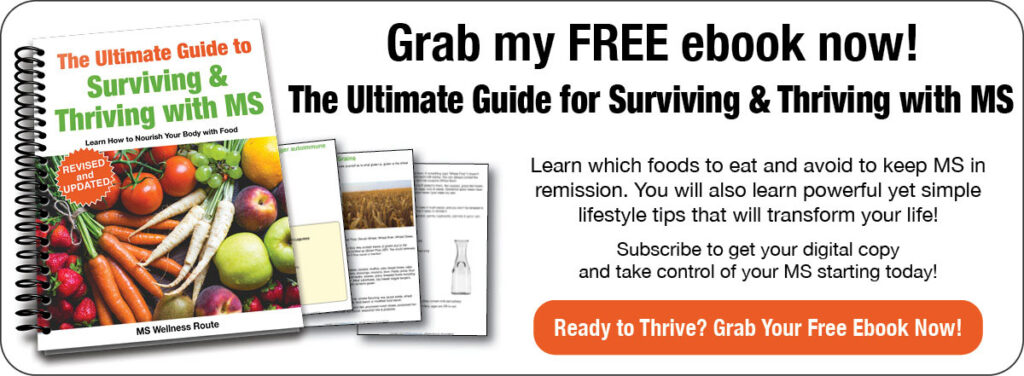Last Updated on November 18, 2023 by Cathy

Multiple sclerosis (MS) is a chronic demyelinating disease of the central nervous system. And chronic diseases are the result of inflammation.
Chronic inflammation doesn’t happen overnight. It is a slow, long-term inflammation lasting several months to years. Chronic inflammation leads to oxidative stress and mitochondrial dysfunction. – Essential for normal cell function.
Diseases caused by chronic inflammation include:
- Alzheimer’s and dementia
- Asthma and allergies
- Autoimmune diseases such as MS
- Cardiovascular diseases
- Chronic Obstructive Pulmonary Disease (COPD)
- Diabetes, type 1 (an autoimmune disease), and type 2
- Joint diseases such as arthritis
- Osteoporosis and osteopenia
There is a free “Foods to Eat ~ Foods to Avoid” at the bottom of this article.
How does chronic inflammation happen?
Chronic inflammation happens from a poor diet and/or long-term exposure to irritants. Irritants such as bacteria, polluted air, toxic chemicals, or viruses. This activates the immune system. Which sends out inflammatory cells and cytokines (more inflammatory cells).
Even though there is no outside danger. Chronic inflammation continues to send the body danger signals. Over time, this can cause severe damage to joints, organs, and tissues. This constant threat eventually leads to an autoimmune disease.
In arthritis chronic inflammation attacks the joints. Type 1 diabetes chronic inflammation attacks the pancreas. With MS, it attacks the brain, central nervous system, and optic nerve.
Diet and MS

Unfortunately, most people eat a typical Western diet. It is also known as the Standard American Diet (SAD). It includes heavily processed foods high in carbohydrates and refined sugar.
Heavily processed foods include chemicals and ingredients that are hard to pronounce. Produce includes pesticides and meat includes antibiotics, dyes, and growth hormones. Heavily processed foods feed inflammation.
You can choose a diet that feeds diseases or choose a diet that fights diseases.
There are many MS diets to choose from but not one diet is perfect. That’s because each person’s metabolism is different. This makes choosing a diet a hard decision. Although each diet is different, they do have one thing in common. That is… lowering inflammation.

Popular diets for MS include:
- Autoimmune Protocol (AIP)
- Best Bet Diet (BBD)
- McDougall diet (Swank-based diet)
- Mediterranean diet
- Overcoming MS diet (OMS)
- Paleolithic diet (paleo)
- Swank Diet
- Wahls Protocol (paleo-based diet)
The most important choice is a diet that fights inflammation instead of promoting it. Instead of one particular diet, eat a diet that works for you. For example:
- Remove foods that cause inflammation (processed foods, refined carbohydrates, and sugar)
- Identify food sensitivities/intolerances and remove them from your diet such as nightshades
- Provide nutritional support for the body’s detoxification systems
Foods that support the body’s detoxification include:
- Cruciferous vegetables such as asparagus, broccoli, and kale
- Foods rich in vitamin B such as grass-fed beef and liver
- Foods high in omega-3 such as salmon, sardines, and walnuts
Stop Eating these Foods

Stop eating all heavily processed foods, refined sugar, dairy, gluten, and legumes. It not only causes a person to gain weight, but it also leads to chronic diseases.
Gluten is a family of proteins found in grains such as barley, rye, and wheat. Gluten helps food maintain its shape, it is like the glue that holds food together. It also increases inflammation and causes a leaky gut. Gluten-containing foods increase inflammation.
Dairy is highly inflammatory. Studies found drinking cow’s milk increases the risk for autoimmune diseases. One study found women who consumed whole milk had a 47% increased risk of developing MS.
Legumes contain a sticky protein called lectin. Plants use it to defend themselves from insects or us. Most people don’t have a problem eating legumes. But, for people with an autoimmune disease lectins can be difficult to digest. They can also lead to imbalanced gut flora and leaky gut.
Researchers found people with MS have more bad bacteria in their gut than healthy people.
Eat an Anti-inflammatory Diet

To stop inflammation, eat an anti-inflammatory diet including omega-3 fatty acids. Omega-3s and omega-6s are the building blocks of brain and nerve tissue.
Learn how to start an anti-inflammatory diet by reading Anti-Inflammatory Diet For Beginners.
Humans evolved on a diet with a ratio of 1:1 omega-6 to omega-3. However, with the Western diet, the ratio is more like 16:1. Both omega-6 and omega-3 influence gene expression. But, omega-3s have an anti-inflammatory effect where omega-6s do not.
Even if you are eating a “healthy diet” if you aren’t eating enough omega-3s your ratio is off. Pay attention to what you are eating and make sure you are eating a balance of 1:1 omega-6s to omega-3s.
You can get omega-3s from foods such as:
- Cold-water fish (sardines, mackerel, salmon (wild, not farmed)
- Dark-green leafy vegetables
- Raw nuts and seeds
Omega-3 fatty acids are important for rebuilding myelin. You should consider taking a supplement especially if you don’t eat enough omega-3s such as Vimergy Vegan EPA/DHA.
Eating an anti-inflammatory diet helps reduce omega-6s and stabilize insulin (another important factor). Having high blood sugar feeds infections. Such as bacteria, mycotoxins, parasites, and yeast overgrowth.
A hemoglobin A1C is a blood test that measures your average blood sugar from the past 3 months. It’s a common test for people with diabetes. It is a good indicator of overall glycemic health.
Results from an A1C test represent:
- 5.7 or lower: Normal
- 5.7-6.4: Pre-diabetes
- 6.5 or higher: Diabetes
Dr. Terry Wahls, the author of The Wahls Protocol, recommends 5.2 or lower. But, even if your score is 5.3, that is still a good score.
MS is Multifactorial
Researchers believe MS is multifactorial. Meaning, the cause of MS is due to genetic predisposition and environmental factors. You can’t change your genes. But, you can change your gene expression by eating and living a healthy lifestyle.
- Eat a diet that includes mostly vegetables (preferably organic)
- Choose foods high in fiber
- Eat plenty of healthy fats and herbs
- Drink lots of filtered water, at least 2 liters each day
- Eat a moderate amount of fruits and starchy vegetables
- Limit the number of natural sugars you eat such as honey
Besides diet, you need to promote overall wellness by listening to your body. The human body is amazing at healing itself and it will send you signals when something isn’t right.
Remember to exercise, drink plenty of filtered water, get enough sleep, and lower your stress.
You can do this!

Foods to Eat ~ Foods to Avoid
Subscribe for free and I’ll send you the password to my secret library filled with many printables including Foods to Eat ~ Foods to Avoid.
Want to remember this health tip? Pin it to your Pinterest board!

Resources:
https://www.sciencedaily.com/releases/2020/09/200902114455.htm
https://www.ncbi.nlm.nih.gov/books/NBK493173/
https://www.ncbi.nlm.nih.gov/pmc/articles/PMC6132382/
https://pubmed.ncbi.nlm.nih.gov/26400429/
MS and Chronic Inflammation





